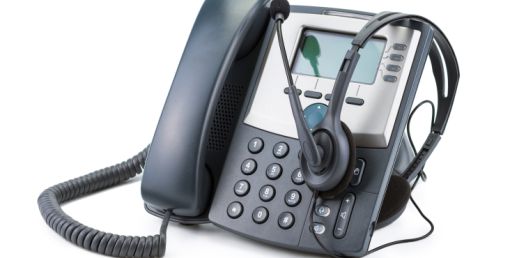 Private Branch Exchange (PBX) systems play a crucial role in managing
communication within businesses. When it comes to acquiring a
phone system,
companies that want an on-premise PBX often face the decision of whether to invest in a new system or
explore the option of purchasing refurbished. In this
article, we will explore the pros and cons of opting for a pre-owned
on-premise PBX. Additionally, we list the top four prominent brands in the
refurbished phone system market, as well other brands likely to
be found. This article aims to help businesses make informed decisions
based on their specific needs and priorities.
Private Branch Exchange (PBX) systems play a crucial role in managing
communication within businesses. When it comes to acquiring a
phone system,
companies that want an on-premise PBX often face the decision of whether to invest in a new system or
explore the option of purchasing refurbished. In this
article, we will explore the pros and cons of opting for a pre-owned
on-premise PBX. Additionally, we list the top four prominent brands in the
refurbished phone system market, as well other brands likely to
be found. This article aims to help businesses make informed decisions
based on their specific needs and priorities.
 Pros:
Pros:
Cost Savings:
Initial Investment: One of the most significant advantages of choosing a refurbished on-premise PBX is the cost savings associated with the initial investment. Refurbished systems are generally much more budget-friendly compared to brand-new alternatives, allowing businesses to allocate resources more efficiently.
Quick Deployment:
Ready-to-Use: Refurbished PBX systems are typically pre-configured and ready for deployment. This means businesses can implement the system quickly, reducing downtime and ensuring a seamless transition in their communication infrastructure.
Limited License and Subscription Fees:
User Fees: Unlike cloud-based solutions, on-premise PBX systems do not incur ongoing monthly subscription costs, making them a cost-efficient alternative over time. Many older on-premise systems, when used secondhand, may not necessitate additional software licensing fees.
Proven Reliability:
Quality Assurance: Refurbished PBX systems often involve installing software updates and patches and performing rigorous testing and quality assurance processes before being resold. This ensures businesses receive reliable equipment that has been thoroughly examined for any potential issues and retain years of useful life.
Cons:
Limited Warranty:
Shorter Warranty Period: Refurbished equipment typically comes with a limited warranty compared to new systems. This may pose a challenge for businesses seeking long-term security and support.
Technological Obsolescence:
Outdated Technology: Pre-owned PBX systems may be based on older technology, potentially limiting the availability of advanced features and functionalities. This could impact a business's ability to adapt to evolving communication needs.
Compatibility Concerns:
Integration Challenges: Businesses might face compatibility issues when integrating a refurbished PBX system with newer technologies or software. This could lead to additional costs and complexities in the long run.
 Vendor Support:
Vendor Support:
Limited Support: Refurbished systems may not receive the same level of vendor support as new systems. This lack of support could result in challenges when troubleshooting issues or seeking assistance for system upgrades. Local telecom vendor support may be non-existent with some systems.
Conclusion:
Deciding whether to invest in a used on-premise PBX system requires careful consideration of a business's specific requirements, budget constraints, and long-term goals. While cost savings and quick deployment are appealing aspects, businesses must weigh these against potential drawbacks, such as limited warranty, difficulty finding competent vendors, and technological obsolescence. Ultimately, the choice between a refurbished and a new on-premise PBX system should align with the company's strategic objectives, how the business utilizes their phone system, and how long their purchased system will remain suitable.
All four brands have earned widespread recognition in the industry, establishing a solid reputation for delivering top-notch and reliable business phone systems. They are often available refurbished from reputable dealers.
The market for pre-owned business phone systems boasts four prominent brands:
- Avaya
- Nortel
- Cisco
- Panasonic
1. Avaya:
Navigating through abundant information and numerous used PBX options can be overwhelming. A better approach might include answering a few questions and comparing quotes for the most suitable solution.
Recognized as a leading force in small business phone systems, Avaya's IP Office stands out for its flexibility, ease of use, and scalability in on-premise deployments. It offers a secure VoIP system, unified communication manager, and supports various phone services, making it an ideal choice for mixed-use facilities. Deployments can be either digital, or IP or a combination of both, and vendors have been established in almost every city.
2. Nortel:
Esteemed for delivering high-quality small business phone systems, Nortel's Norstar Business Phone and BCM systems, cater to the needs of small workgroups and low-intensive users. It provides a feature-rich portfolio, enhancing capabilities for small business environments.
3. Cisco:
Renowned for innovative telephony features, Cisco offers pre-owned phone systems suitable for businesses seeking reliable and full- featured communication solutions. With a range of IP PBX solutions for enterprises of varying capacities, Cisco excels in unified messaging, mobility, auto-attendant, instant messaging, video conferencing, and more. Complete refurbished systems can be purchased for a fraction of the initial cost when new.
4. Panasonic:
A premier supplier with an extensive history, Panasonic provides both cordless and corded options across its KX series of PBXs. These systems offer diverse features and capabilities to meet different business needs, supporting proprietary telephones, IP telephony, and various communication applications.Business owners frequently consider these other reputable brands:
ShoreTel evolved into the Mitel MiVoice after 2017. A refurbished ShoreTel package, comprising proprietary IP phones and servers, offers businesses an advanced platform and a robust feature-set.
Sangoma, Asterisk-based communications servers (FreePBX, PBXact and Switchvox) are highly regarded. Used Sangoma Asterisk solutions remain a good value.
Samsung OfficeServ servers have proven to be efficient durable systems. However, finding ongoing support could become a challenge. For small to medium-sized businesses they offer digital or IP phones, analog CO line support (FXO and T1), and voicemail to email.
Siemens Unify HiPath, a once popular on-premise PBX accepted a combination of TDM, analog, and IP telephones. However, it's important to note that its end-of-life status and lack of support since 2017 have created an expected lack of telecom professionals who work on these PBXs.
Other solid manufacturers that have been making excellent on-premise phone systems are NEC, Zultys, Allworx, Yeastar, and Grandstream.
Wrap up: How to determine which brand would be the best used business phone system.
Determining the ideal used business phone system brand requires comprehensive research, taking into account specific business needs. Factors like cost, maintenance, features, and long-term stability are best assessed with guidance from a telecom professional, ensuring an informed decision for the most suitable and effective business communication solution.